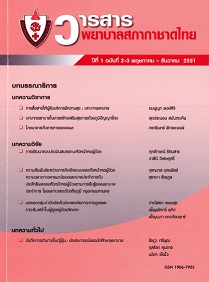ความสัมพันธ์ระหว่างการคิดเชิงระบบของหัวหน้าหอผู้ป่วย ความฉลาดทางอารมณ์ของพยาบาลประจำการกับประสิทธิผลของหัวหน้าหอผู้ป่วยตามการรับรู้ของพยาบาลประจำการ โรงพยาบาลระดับตติยภูมิ กรุงเทพมหานคร
Keywords:
การคิดเชิงระบบของหัวหน้าหอผู้ป่วย, ความฉลาดทางอารมณ์, ประสิทธิผลของหอผู้ป่วย, systems thinking of head nurses, emotional intelligence, effectiveness of patient unitsAbstract
การวิจัยแบบความสัมพันธ์ครั้งนี้มีวัตถุประสงค์เพื่อศึกษาความสัมพันธ์ระหว่างการคิดเชิงระบบของหัวหน้าหอผู้ป่วย ความฉลาดทางอารมณ์ของพยาบาลประจำการกับประสิทธิผลของหอผู้ป่วยตามการรับรู้ของพยาบาลประจำการ โรงพยาบาลระดับตติยภูมิ กรุงเทพมหานคร กลุ่มตัวอย่างคือ พยาบาลประจำการที่มีประสบการณ์ทำงานในหอผู้ป่วยตั้งแต่ 1 ปีขึ้นไป โรงพยาบาลระดับตติยภูมิ กรุงเทพมหานคร จำนวน 365 คน ได้จากการสุ่มแบบหลายขั้นตอน เครื่องมือที่ใช้เป็นแบบสอบถามมี 3 ตอน คือ การคิดเชิงระบบของหัวหน้าหอผู้ป่วย แบบประเมินความฉลาดทางอารมณ์ของพยาบาลประจำการ และแบบสอบถามประสิทธิผลของหอผู้ป่วย เครื่องมือได้รับการตรวจสอบความตรงตามเนื้อหา และวิเคราะห์หาค่าความเที่ยงของแบบสอบถามโดยหาค่าสัมประสิทธิ์แอลฟ่าของครอนบาคได้ .97, .91 และ .89 ตามลำดับ วิเคราะห์ข้อมูลโดยใช้การแจกแจงความถี่ ค่าเฉลี่ย ส่วนเบี่ยงเบนมาตรฐาน และค่าสัมประสิทธิ์สหสัมพันธ์แบบเพียร์สัน
ผลการวิจัยพบว่า
1. ประสิทธิผลของหอผู้ป่วย และการคิดเชิงระบบของหัวหน้าหอผู้ป่วยตามการรับรู้ของพยาบาลประจำการ โรงพยาบาลระดับตติยภูมิ กรุงเทพมหานคร โดยรวมอยู่ในระดับสูง
( = 3.71, SD = .61 และ
= 3.88, SD = .56 ตามลำดับ)ความฉลาดทางอารมณ์ของพยาบาลประจำการ โรงพยาบาลระดับตติยภูมิกรุงเทพมหานคร โดยรวมอยู่ในระดับปานกลาง (
= 151.26, SD = 33.59)
2. การคิดเชิงระบบของหัวหน้าหอผู้ป่วย และความฉลาดทางอารมณ์ของพยาบาลประจำการมีความสัมพันธ์ทางบวกในระดับปานกลางกับประสิทธิผลของหอผู้ป่วย (r =.45 และ .32 ตามลำดับ) อย่างมีนัยสำคัญทางสถิติที่ระดับ .05
Relationships Between Systems Thinking of Head Nurses, Emotional Intelligence of Staff Nurses, and Effectiveness of Patient Units as Perceived by Staff Nurses, Tertiary Hospitals, Bangkok Metropolis
The purposes of this correlational research were to study the relationships among systems thinking of head nurses, emotional intelligence of staff nurses and effectiveness of patient units as perceived by staff nurses, tertiary hospitals,Bangkokmetropolis. The research subjects consisted of 365 staff nurses, randomly selected through a multistage random sampling technique. The research instruments comprised three questionnaires: the first on the systems thinking of head nurses, the second on the emotional intelligence of staff nurses and the third on the effectiveness of patient units. The questionnaires were tested for content validity: Cronbach’s alpha coefficients were at .97, .91 and .89 respectively. The data were analyzed using frequency, mean, standard deviation and Pearson’s product moment correlation coefficient.
The findings were:
1. The effectiveness of patient units and systems thinking of head nurses as perceived by staff nurses at tertiary hospitals in the Bangkok metropolis were at a high level (= 3.71, SD = .61 and
= 3.88, SD = .56 respectively). The emotional intelligence of the staff nurses were at a medium level. (
= 151.26, SD = 33.59).
2. The systems thinking of head nurses and emotional intelligence of staff nurses were significantly correlated positively with the effectiveness of patient units at the .05 level. (r =.45 and .32 respectively)
Issue
Section
License
เนื้อหาบทความหรือข้อคิดเห็นต่างๆ ในวารสารพยาบาลสภากาชาดไทยนี้ เป็นความคิดเห็นของผู้เขียนบทความ ไม่ใช่ความเห็นของกองบรรณาธิการ หรือสถาบันการพยาบาลศรีสวรินทิรา สภากาชาดไทย






